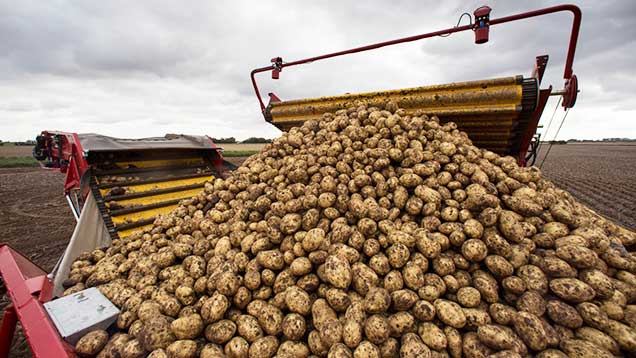5 reasons why European growers can grow potatoes for less
 © Tim Scrivener
© Tim Scrivener A study tour has identified several important differences between the processing sectors in the UK and north-west Europe, which may explain the difference in cost of production.
There have been claims that European growers can produce processing potatoes for €80/t (£56) or less, much lower than the UK figure of €176/t (£124) for 2012.
So to determine if this is the case and identify any lessons for the UK, the AHDB organised a study tour to France, Holland and Belgium with 22 growers. It then published a report on its findings in collaboration with Andersons director Jay Wootton.
See also: Keep track of potato storage costs with new online tool
Mr Wootton explained that obtaining comparable data is a real challenge, as there are enormous differences on how costs are measured.
“There were case study farmers claiming to grow potatoes for €80/t, but closer inspection showed it didn’t include family labour costs.”
To address this, using a large amount of data, the cost was modelled to produce full costs, including depreciation, family labour, rent and finance.
“It confirmed that full potato production costs are lower in Europe. But they are likely to be more than €110/t instead of the claimed €80/t,” said Mr Wootton.
So what are the key differences between the sectors on both sides of the English Channel?
1. No destoning
Mark Jones of Maincrop Potatoes, who was on the study tour, highlighted that there was little evidence of destoning, as soils contained fewer stones.
“Soils did not require destoning and most farms were running single-pass operations. This is a considerable cost saving.”
2. Family labour
In the three countries, a notable difference was the lack of full-time labour on the average potato farm, with less casual labour.
“Casual labour is a big part of UK costs and is typically supplied from an outside source, such as gang labour or agency staff.
“In Belgium for example, they use a lot of family labour. Family members take their holiday to coincide with harvest and help out.”
3. Wholecrop contracts
However, one of the biggest savings for north-west European growers is the different approach to contracts, being to a lower specification than in the UK.
Most processing crops are grown on a whole crop basis with everything above 40mm being taken by the processor. This simpler approach means there is no need for any grading kit on farm and the associated labour, said Mr Jones.
4. Lower machinery spend
Speaking to Farmers Weekly, Mr Wootton said the UK sector is well mechanised, but despite investment in the past three years, a lot of machinery is older than the average.
“In contrast, we saw many nice, clean stores that are more than 20 years old. European farmers were also operating older, but well maintained machinery.
5. PCN-tolerant varieties
Mr Jones noted that potato cyst nematode (PCN) was much less of an issue in Europe, with little evidence of a widespread problem. Despite tighter rotations, the use of chemical is an exception. “PCN is managed by variety rather than nematicides.”
Grower can obtain a copy by visiting the AHDB Potatoes website.

